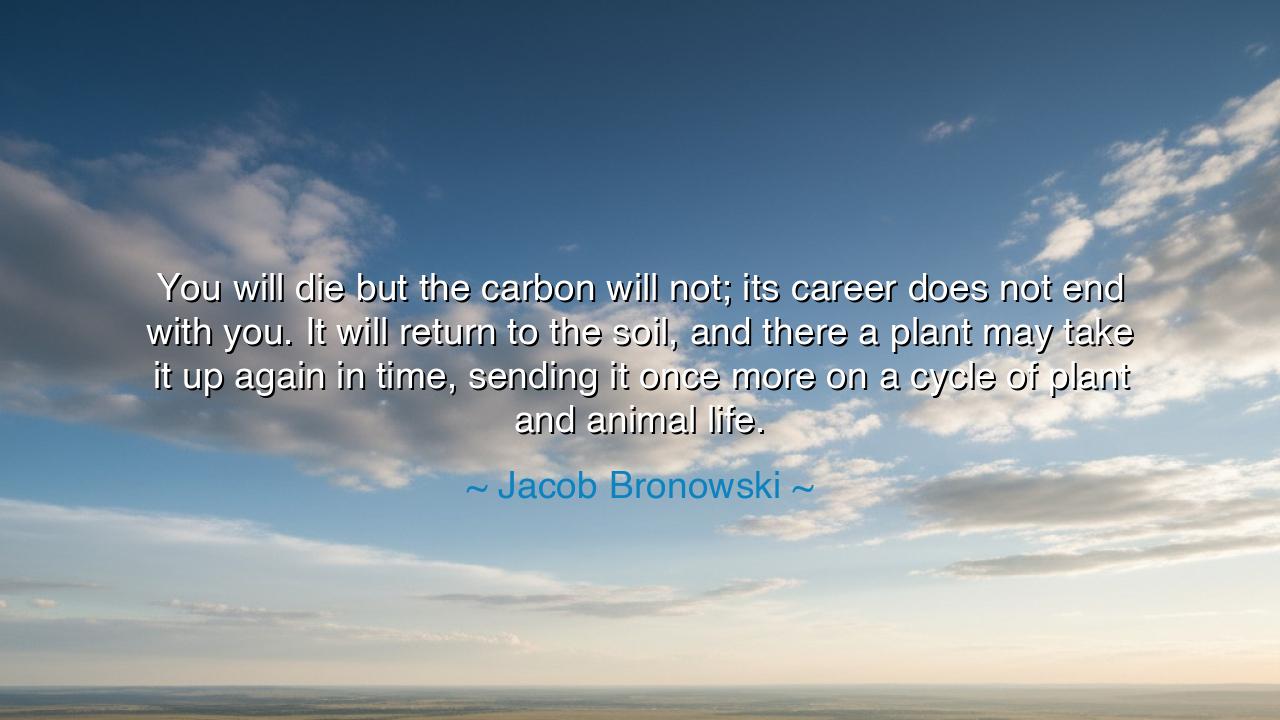
You will die but the carbon will not; its career does not end
You will die but the carbon will not; its career does not end with you. It will return to the soil, and there a plant may take it up again in time, sending it once more on a cycle of plant and animal life.






In the luminous words of Jacob Bronowski, the scientist-philosopher who sought to bridge the worlds of art and reason, we encounter a truth both humbling and transcendent: “You will die but the carbon will not; its career does not end with you. It will return to the soil, and there a plant may take it up again in time, sending it once more on a cycle of plant and animal life.” Within this simple statement lies a revelation as old as the stars—that though flesh perishes, the elements endure; that the cycle of life is eternal, unbroken, and divine. It is a reminder that we are not apart from nature, but of it, woven from the same dust that once danced in the heart of suns.
To the ancients, this would have been no strange teaching. They knew that death was not an end but a transformation, that the earth reclaims what it lends. When a body falls to the ground, it does not vanish into nothingness—it is taken apart gently by time, its pieces scattered to serve the living once more. The carbon, the breath of our cells, returns to the soil and the air, waiting patiently to be born anew as leaf or flower, beast or bird. Thus, in every green blade and every living thing, there beats the rhythm of all who came before. To understand this, Bronowski tells us, is to find peace amid mortality and wonder amid decay.
In his words, there is both science and poetry—the poetry of truth. The carbon he speaks of is the element of life itself, the skeleton of all living forms, the thread that binds us to every creature that ever lived. It is the carbon of the first breath of the first creature in the sea, the same that now courses through your veins. When you die, it will not die with you. It will return to the soil, become the nourishment of a tree, perhaps the pulse of another life. In this eternal circulation, there is no true death, only renewal. The ancients called this the Wheel of Life, the endless turning of creation and dissolution, where all things give way only to return again.
Think of the ashes of a forest fire. To the eye, it seems like destruction—charred remains, silence, loss. Yet in those ashes, rich with carbon, lie the seeds of rebirth. Rain falls upon them, the soil awakens, and from the blackened earth rises new green life—stronger, richer, and more radiant than before. This is the eternal pattern Bronowski evokes: that every ending nourishes a beginning. The career of carbon is the grand metaphor of existence itself—proof that even in death, we give life; even in silence, we prepare the next song.
And is this not the story of humanity as well? Each generation lives and fades, but the essence—the thoughts, the art, the discoveries—flows onward, taken up by those who come after. Just as the carbon moves through soil and root and vein, so too does the spirit of humanity flow through time. What one man learns becomes the seed for another’s wisdom; what one woman dreams becomes the fire for a future heart. We are not isolated sparks, but part of a cosmic continuity, a living legacy of matter and meaning intertwined.
Bronowski’s vision urges us to look upon death not with dread, but with reverence. To know that the very atoms within us have known other forms—mountain and river, leaf and bone—is to glimpse eternity. When we die, we do not fall into void, but into oneness. Our dissolution is nature’s alchemy, our end her beginning. This knowledge frees the spirit from fear, reminding us that the purpose of life is not to resist change, but to contribute to the ever-turning cycle of becoming.
So, O listener, learn from the wisdom of the carbon: do not cling too tightly to form, for form is fleeting. Instead, cherish your brief moment as part of the living chain. Live well, so that the energy you return to the world is noble and pure. Plant trees whose roots may one day draw your dust into their strength. Nurture the soil, for it will one day cradle your essence. Respect every creature, for in its eyes and breath may dwell a fragment of your ancient self.
And remember this final truth: you are not a stranger to the earth—you are her continuation. You will die, but the carbon will not. Your body will dissolve, but your substance will dance again in the wind, the rain, the growing green. Thus, death is not an ending but a promise—a promise that nothing is ever lost, only changed. Embrace this, and you will live not in fear, but in harmony, knowing that you are forever part of the eternal cycle of life.






AAdministratorAdministrator
Welcome, honored guests. Please leave a comment, we will respond soon